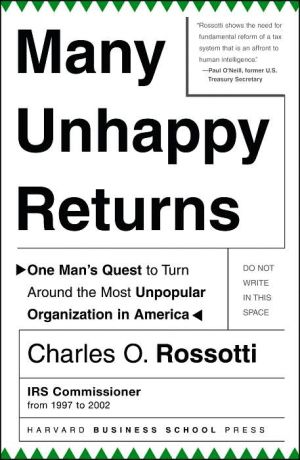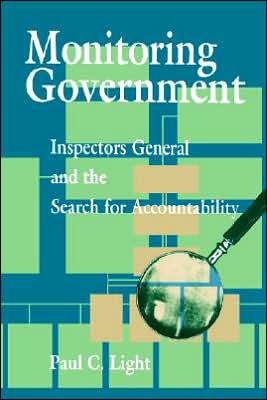Many Unhappy Returns: One Man's Quest to Turn Around the Most Unpopular Organization in America
No one believed the IRS could ever run like a twenty-first-century business. Until it did.\ When Charles O. Rossotti became Commissioner of the Internal Revenue Service in 1997, the agency had the largest customer base-and the lowest approval rating-of any institution in America. Mired in scandal, caught in a political maelstrom, and beset by profound management and technology problems, the IRS was widely dismissed as a hopelessly flawed enterprise.\ In Many Unhappy Returns, Rossotti-the...
Search in google:
Rossotti is not alone in having managed 100,000 employees serving 180 million customers. He is also not alone in succeeding at turning an organization with significant political, management and technological problems into a modern business. His particular claim to fame is that he managed to do this in five years as head of the Internal Revenue Service. While he may not have succeeded at making us all love the IRS, he at the very least saw to it that significantly less of the two trillion dollars it collected each year went into sustaining outmoded operations, pathetically inadequate systems, and entrenched bad management. He describes how he made significant changes and also what remains to be changed, including the tax code and the way elected officials create budgets. Annotation ©2005 Book News, Inc., Portland, OR Publishers Weekly A successful businessman but political neophyte, Rossotti was appointed commissioner of the Internal Revenue Service in 1997; this book is a matter-of-fact recounting of his five-year tenure, which included many of President Bush's changes to the code. An entertaining insider's account, it reads like the bureaucratic equivalent of a police procedural. With refreshing clarity, Rossotti describes such impediments as political pressure from the White House and the "senseless issues that the [IRS] lawyers insisted on pursuing." None of the villains are identified by name, but the author's determination to name and praise everyone who helped sometimes make the book read like an overlong Academy Awards acceptance speech. It succeeds as a management case study, clearly laying out Rossotti's initial analysis of apparently intractable problems, followed by the development of strategies for change, the recruitment of stakeholders and the use of skills and tricks required to shepherd the process to a successful conclusion. And the book demonstrates that dedication by honest and talented managers can produce results (even if one disagrees with them). It's also an inspiring bit of political truth telling. (Mar. 8) Copyright 2005 Reed Business Information.
Prologue : why I wrote this story11The IRS is out of control72Operating on good, sound business principles253You're gonna do what?374Promising everything to everybody will not get us there535If you already have an 83,000-page rules manual, will more rules solve your problems?716So many people, so much distrust817Will people always hate the tax collector?1038When everybody is your customer and the tax code is your Bible1279When are you going to fire the management and punish the wrongdoers?14910Replacing the furnace in the basement and calling it a Christmas present16511You want more money after wasting $4 billion on computers that don't work?19512The cover-up is worse than the crime22113Why people think the IRS picks on the little guy and lets the big guy get away23914The IRS can't fix the tax code and the budget269Epilogue : what the story tells us287AppIRS budget and productivity : how the IRS uses its budget301
\ Publishers WeeklyA successful businessman but political neophyte, Rossotti was appointed commissioner of the Internal Revenue Service in 1997; this book is a matter-of-fact recounting of his five-year tenure, which included many of President Bush's changes to the code. An entertaining insider's account, it reads like the bureaucratic equivalent of a police procedural. With refreshing clarity, Rossotti describes such impediments as political pressure from the White House and the "senseless issues that the [IRS] lawyers insisted on pursuing." None of the villains are identified by name, but the author's determination to name and praise everyone who helped sometimes make the book read like an overlong Academy Awards acceptance speech. It succeeds as a management case study, clearly laying out Rossotti's initial analysis of apparently intractable problems, followed by the development of strategies for change, the recruitment of stakeholders and the use of skills and tricks required to shepherd the process to a successful conclusion. And the book demonstrates that dedication by honest and talented managers can produce results (even if one disagrees with them). It's also an inspiring bit of political truth telling. (Mar. 8) Copyright 2005 Reed Business Information.\ \








